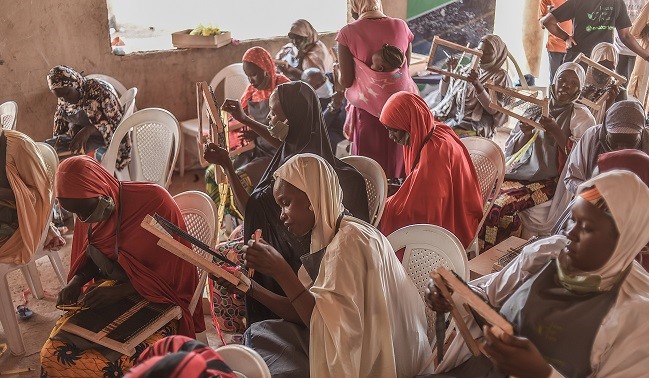Various actors across the climate change community in Nigeria have concurred with the view that the Federal Government should pay more attention to the provision of climate adaptation mechanisms to enhance the realisation of the Green Job Assessment Programme (GJAP).

The ongoing consultation exercise and compilation of multi-sectoral inputs to review the Nationally Determined Contribution (NDC) to include national economic recovery initiatives and the just transition plan is a clear indication that the government is truly worried about the obvious realities of the socio-economic impacts of climate change.
Presently, the country is faced with perhaps the most challenging economic downturn in its history because of the Coronavirus pandemic that forced the government to shutdown almost all economic activities in March 2020. For Nigeria, a health crisis that is driven by huge cash flow reversals and increasing unemployment rate, fuelled by layoffs in approximately all sectors of the economy is a multilayered quandary.
Several recovery schemes have been introduced into the Economic Sustainability Plan (ESP) to cushion the devastating impacts of the pandemic. The government believes that the transition process has to be participatory, and citizens must take ownership to ensure its successful accomplishment. And this would be achieved by assessing the negative and positive employment impacts of the current state of affairs and provide the right mechanism to measure the required action that will help foster a green economy that is just and sustainable.
Meetings with different stakeholders unveiled so many critical issues that the NDC must consider. At the heart of the dialogue is the need to commit additional finance to provide more infrastructural facilities. They want the investment to focus on creating eco-friendly jobs in the energy and power, industry, water, as well as agricultural sectors to increase citizens’ resilience and response to climate action.
The question of poor waste management and how to reduce emissions from deforestation are among the trending matters in the climate conversation. With a growing rate of over 32.4MtC02 of emissions generated from forest degradation annually, it is needless to mention the urgency required to salvage the country’s forest reserves.
Despite their support for a smooth transitional plan, the industry observers, however, are still very skeptical about the processes; they want the government to do some housekeeping mostly in building cohesion between the national and states governments in the execution of climate change policies.
These crusaders are asking that the government should be more intentional in responding to the climate struggle and demonstrate more political commitment through the establishment of new legislations so as to safeguard the environment.
The consultant who compiled the national strategic plan that will guide the implementation of Reducing Emissions from Deforestation and forest Degradation (REED+) project in Nigeria, Mr. Atah Anthony, is desirous to see high level policy intervention and mobilisation of affected communities at the grass roots. He would like the government to champion this responsibility by moving from signing things on paper into actually putting them into action.
This action must come from both national and sub-national level together with identifying funding sources to effectively handle climate change mitigation and adaptation under the green job agenda.
After a careful assessment of forest use in the country, participants who gathered at a workshop to validate the REDD+ national strategic document in Abuja, urged the government to halt all forest activities and declare state of emergency in the sector.
“I agree with the stakeholders that the government need to consider declaring state of emergency in the forest sector because we are losing our forest much more than we can ever imagine,” Anthony said.
Rita Idehai, the CEO of Ecobarter, is another loud voice in the sustainability sphere who is empowering indigent women on how to collect and transform waste into wealth. The geologist-turned-social-entrepreneur also agrees that the government has shown enough commitment in the area of policy enactment, but she still craves to see such assurance in terms of infrastructural development to help the citizens adapt.
“I will say they are trying,” according to her, “when it comes to policies because some of them have been passed over the last few years, but when it comes to the actual implementation and infrastructure that we can see and use and say now we are changing, I have not seen a lot of that.”
If she had the magic power to end the entire climate change crisis, Idehai said she would embark on massive public education campaign and formulate a law that mandates waste management in Nigeria. Her wish is for everybody to know that waste is actually resources, and it has the potential to change their lives.
The supervising director at the Department of Climate Change (DCC) in the Federal Ministry of Environment, Mrs. Halima Bawa-Bwari, is optimistic that Nigeria is capable of achieving her climate aspiration of reducing carbon emissions to promote sustainable living. She said the NDC revision which is a demonstration of how Nigeria will contribute to the global efforts in combating climate change as agreed during the Conference of Parties (COP21) in Paris in 2015 will take account and address all the concerns raised by stakeholders in the final report.
“We need to engineer a new future, one that harnesses the power of technology and innovation in the service of the people and our planet,” said Bawa-Bwari, at a validation workshop held in Abuja to enhance Nigeria’s Energy Statistics.
Considering all the acrimonies from the stakeholders and government promises, it would be unfair not to inform that the quest for a progressive lifestyle must be one of realism because countries are grappling with so many issues. So, the government must realistically acknowledge these setbacks and figure out the pathway to a better future.
By Etta Michael Bisong, Abuja
